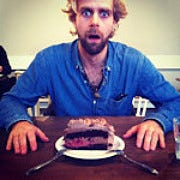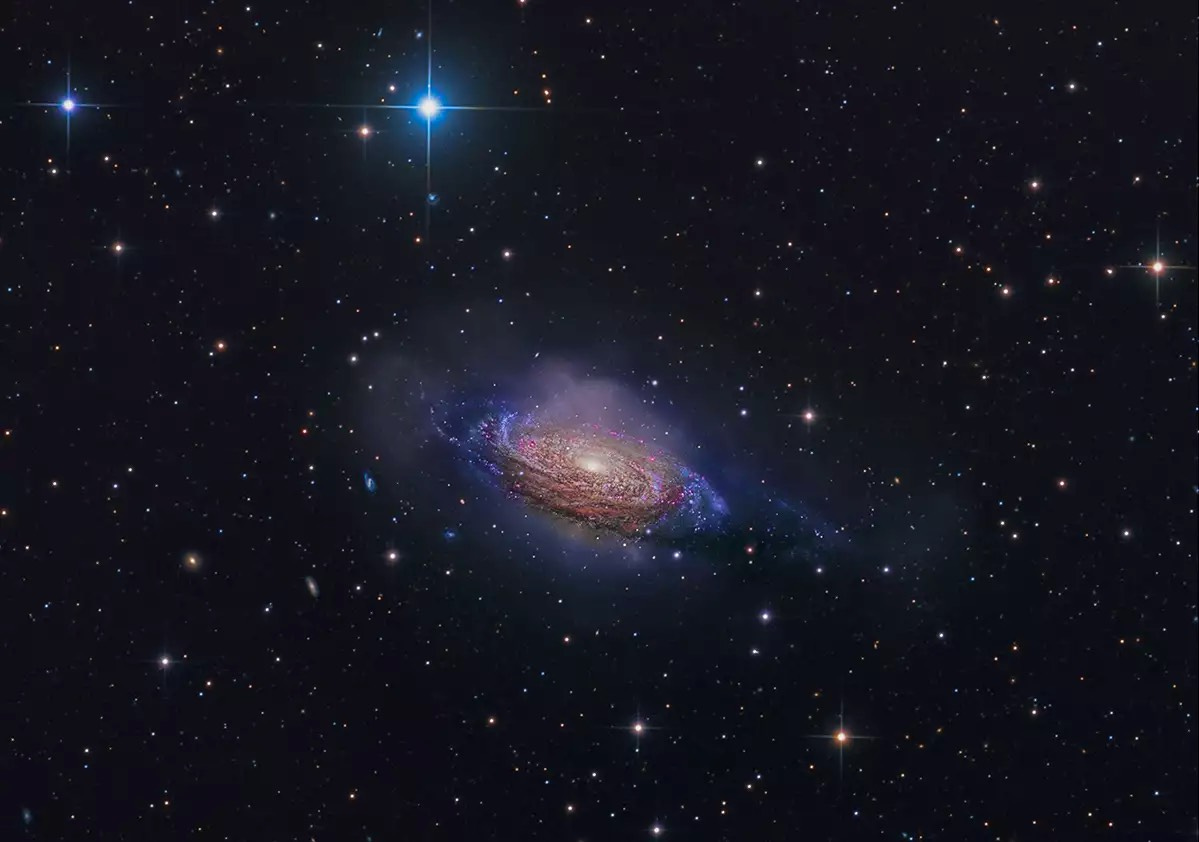#101: What, where or whom is a gift?

I still don't know what sort of things to put here - any ideas? In the meantime, here's a photo of a real gift of a morning, running through Stoke Park.
Happy Friday!
November is the month of Gifts
Welcome to the first episode of my new thematically organised Happy Friday email. I'm excited. Are you excited? Well, never mind, because this month's theme is... GIFTS - those wonderful bundles of unwrappable excitement!
Right, let's get cracking, shall we? Umm... What, where or whom is a gift?
Oh jeez. Where is this going? Is this going to make an interesting newsletter? Crap. I have no idea.
Let's start with that last resort of hapless students everywhere: looking up words in the Oxford English Dictionary. (OED.com, accessible by subscription: your library almost certainly has a subscription that you can use from anywhere. It's incredible.)
I choose to ignore the etymology – from the Old English gift meaning payment for a wife – and instead zero in on the common definition:
A gift is something, the possession of which is transferred to another without the expectation or receipt of an equivalent.
Point A: I don't know about you, but my first reaction when I read the bit about without the expectation or receipt of an equivalent was 'Yeah, nice, but...'
When someone gives me a birthday present, I feel kind of obliged to return the generosity when their turn rolls around. It's a bit of a pain in the ass, but that's the way things work among normal human beings, isn't it?
There are a few other rules that I must remember:
Obviously, don't buy them exactly the same thing: that would be, at the very least, eerie.
Also don't calculate the exact monetary value of their gift and reciprocate accordingly: that would be too much hard work (not to say fraught with complications in our globalised economy).
And certainly don't simply return the gift they gave you: that's tantamount to declaring a blood feud.
But deep down I still feel an obligation to give them something, probably something that I've thought a bit about and decided that they'd probably like; something that's commensurate with what I can afford in terms of time, money and skills, and with what I think of our relationship to each other.
So, good start from the OED, but it doesn't come near to capturing the whole human comedy of gift-giving.
~
My next question moves us forward a little further: What sort of things are gifts?
And my first answer when I asked myself this question was: life. (Typical hippie answer, but bear with me...)
Point B: Life itself is a gift, freely bestowed upon us without expectation or receipt of an equivalent – isn't it?
Did you demand to be born? Did you order your life on Etsy? Did the midwife thrust a bill of sale into your bloodied mitts the moment she cut the umbilical cord?
Oh yeah – this email got deep.
~
Combining Point A with Point B, we come to question of two parts: Towards whom should we feel the obligation, and how the dickens and dorothy might we begin to reciprocate such an awesome gift?
This email will end with my first essays at answers to this final question:
Our parents.
Honour thy parents, for pity's sake – after all, they started this whole thing!
(For you, at least.)
(Unless thy parents were the Adam and Eve, in which case they really did start this whole thing.)
(And, in which further case, while we're here, I've got to tell you: keep your eyes peeled for persuasive reptiles.)
Ourselves.
How gross is it when people don't appreciate the gifts you give them? Don't be that guy.
Don't forget what you've been given, or treat life like an ungrateful douche. Respect this unbelievably awesome gift, make the most of the opportunities that being alive offers you, and use as inspiration the highest hopes of those who gave you life.
Our society.
Our lives are only possible because of the support of the society around us. Society might be bloody awful – why do we still have enforced borders, 30mph speed limits in built-up areas and no pockets on women's clothing?
For better or worse, whatever society we live in still sustains us with its housing estates, hospitals, arable farms, Premier League football and branches of Waitrose.
We can show our gratitude by supporting the lives of others around us and helping them make the most of their gifts. (And by cycling when we can.)
Us Humans.
It's in the nature of gifts that they are impossible to repay precisely. Unless you upgrade to God status, you will never be able to comprehend, let alone return, refund or reconstitute all the billions of atoms that your existence has disturbed.
But we can give the gift of life to others through life-saving medicine, emergency rescue or suicide intervention. We can also pass on such a gift to a new generation by starting a family or adopting.
This is probably the closest most people not working for Google will get to God status. We should try not to abuse that power, I guess.
Our planet.
Ultimately, though, our living, breathing, crapping existence is utterly unimaginable without the cosy oxygen of our environment. So our deepest obligation of gratitude surely must be towards the planet on which we live out our ridiculous lives. (NOTE: If you're Elon Musk, this gratitude extends to the rest of the Solar System / Galaxy / Universe.)
As decent guests of a planet that showers us with inconceivably generous gifts, we have to do whatever we can to show our appreciation. It might not be much – no gift could ever be commensurate – but even a thank-you card would be greatly appreciated.
~
So let's go into the weekend with the oh-crap-now-I've-got-to-get-them-something mindset of someone who's just been given a wonderful gift.
And let's make that something a something that we've thought a bit about and decided that they'd probably like; something that's commensurate with what we can afford in terms of time, money and skills, and with what we think of our relationship to each other and to our planet.
Next Week: The Psychology of Gifts and Gift-Giving (it'll be sciencey). Unless one of you gives me a better idea.
Where next?
Or: Five Things that inspired today's Episode
The Gift of the Magi, a short story by O. Henry. '...let it be said that of all who give gifts these two were the wisest.'
Trees for Cities 'No plans 1st to 2nd December? We’re planting 25,000 trees in London and you can join in!'
Charity or Solidarity? by me. 'On my first day here, an Afghan bluntly asked, "Who pays your wages?" I replied that I was not being paid at all. He stared at me in disbelief. "Why are you here, then?"'
John Green: Make gifts for people (Zen Pencils) Beautiful words about art and gifts set to a comic about an aviator. Also available in less beautiful YouTube format.
#15: We all live moneyless by me. 'The fact is that most of life is made up of spider’s web networks of cashless exchange, favours and gifts. Yes, I spend money six days out of seven, but I am reliant on friends and neighbours for almost every single moment – certainly all the most important ones.'
~
And thanks for all your suggestions for future themes. Adventure, psychedelics, philosophy, comedy and fad diets will all be making an appearance in the coming episodes... Keep them coming!
Now On: The Viktor Frankl 5-a-day Book Club!
Membership Criteria: Read 5 pages a day of Man's Search for Meaning to complete the whole darn text in only 28 days.
Catch up on the past 26 days online.
Day 27
Today's pages (p145-147) address the question of the meaning of life itself. Finally - the promised land!
But rather than The Meaning Of Life As A Whole, Viktor Frankl has a smaller target in mind, at least at first:
[T]he logotherapist is concerned with the potential meaning inherent and dormant in all the single situations one has to face throughout his or her life.
Frankl doesn't deny that The Meaning Of Life As A Whole does exist, but that we can only fully understand it after having understood the meaning of each of the smaller moments leading up to the final moment of our death.
It's like watching a film, Frankl says: the final meaning of the story as a whole can only be understood if you've understood the meaning of each preceding scene.
Doesn't the final meaning of life, too, reveal itself, if at all, only at its end, on the verge of death? And doesn't this final meaning, too, depend on whether or not the potential meaning of each single situation has been actualised to the best of the respective individual's knowledge and belief?
So The Meaning Of Life As A Whole depends on, and is built up from the meanings we find in each moment of our lives.
The art of finding meaning in these individual moments is not complicated, but quite simply 'becoming aware of what can be done about a given situation'.
Becoming aware
Frankl suggests two approaches to the awareness of meaning:
Biographical. Frankl quotes Charlotte Bühler: 'study the lives of people who seem to have found their answers to the questions of what ultimately human life is about as against those who have not.'
Biological. Frankl suggests that we use our conscience as a prompter to indicate 'the direction in which we have to move in a given life situation'.
Frankl calls this second approach 'biological' because he believes that our conscience is based on values that are hard-wired and have crystallised over millennia during our evolution as a species.
What can be done?
Now we have awareness, we come to what can be done. Logotherapy has 'three main avenues' that lead us to meaning in life, and they are worth repeating:
Work. Creating a work or doing a deed: the external world of achievement.
Love. Experiencing something or encountering someone: the internal world of experience.
Suffering. Rising above and growing beyond personal tragedy: 'even the helpless victim of a hopeless situation, facing a fate he cannot change ... may turn a personal tragedy into a triumph'.
It is worth stressing that these three are equals in the search for meaning. There is no hierarchy here: you either find meaning, or you don't.
Finding meaning through work is not superior to finding meaning through love, despite everything your boss might say.
Likewise, although suffering may not be desirable, personal tragedy provides the opportunity for personal growth and meaning. Having said that, Frankl does make it very clear that the suffering must be unavoidable. Masochism is not heroism.
--
We FINISH next week... How exciting!
Thanks for reading, have a glorious weekend - and I hope you enjoyed this gift!
Much love,
- dc

CREDITS
David Charles wrote this newsletter. David is co-writer of BBC Radio sitcom Foiled, and also writes for The Bike Project, Elevate and Thighs of Steel. He can be found here: davidcharles.info and on Twitter @dcisbusy

The Royal Observatory has announced the winners of the Astronomy Photographer of the Year. Via Kottke.org.
Oh yeah, and I need a constant supply of images for this whimsical photo slot. If you find any, please send them over!


